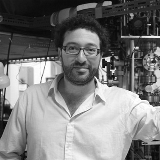About
Aephraim Steinberg is a physicist whose interests lie in fundamental quantum-mechanical phenomena and the control and characterization of the quantum states of systems, ranging from laser-cooled atoms to individual photons.
His experimental program is two-pronged, using both non-classical two-photon interference and laser-cooled atoms to study quantum information and computation, decoherence and the quantum-classical boundary, tunneling times, weak measurement and retrodiction in quantum mechanics, and the control and characterization of novel quantum states.
Awards
- Fellow of the Royal Society of Canada, 2016
- Physics World Breakthrough of the Year, 2011
- E.W.R. Steacie Memorial Fellowship, 2007
Relevant Publications
Tham, W. K., Ferretti, H., Bonsma-Fisher, K., Brodutch, A., Sanders, B. C., Steinberg, A. M., & Jeffery, S. (2020). Experimental demonstration of quantum fully homomorphic encryption with application in a two-party secure protocol. Physical Review X, 10(1), 011038.
Hallaji, M., Feizpour, A., Dmochowski, G., Sinclair, J., & Steinberg, A. M. (2017). Weak-value amplification of the nonlinear effect of a single photon. Nature Physics, 13(6), 540-544.
Tham, W. K., Ferretti, H., & Steinberg, A. M. (2017). Beating Rayleigh’s curse by imaging using phase information. Physical review letters, 118(7), 070801.
Rozema, L. A., Mahler, D. H., Hayat, A., Turner, P. S., & Steinberg, A. M. (2014). Quantum data compression of a qubit ensemble. Physical review letters, 113(16), 160504.
Rozema, L. A., Mahler, D. H., Blume-Kohout, R., & Steinberg, A. M. (2014). Optimizing the choice of spin-squeezed states for detecting and characterizing quantum processes. Physical Review X, 4(4), 041025.
